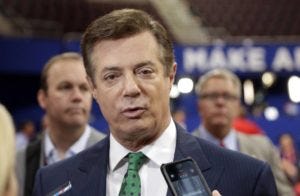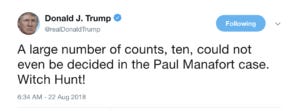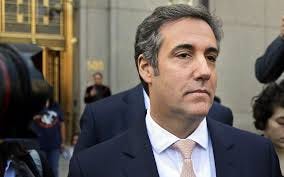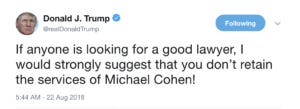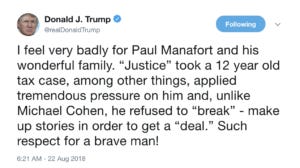Manafort and Cohen: Trump's Terrible, Horrible, No Good, Very Bad Day
August 21, 2018 was a watershed in the investigations surrounding president Trump. A jury in Virginia found his former campaign chairman, Paul Manafort, guilty on eight felony counts. Almost simultaneously, in New York, Trump’s former personal attorney Michael Cohen pleaded guilty to eight felony counts of tax evasion, bank fraud, and orchestrating illegal campaign contributions for Trump’s 2016 campaign. It was a remarkable day for a president who campaigned promising to surround himself with “only the best people.” Although both cases are linked to Trump, they have different implications for the president, the Mueller investigation, and for what might be coming next from federal prosecutors.
Paul Manafort
The Manafort Conviction
Paul Manafort was the first defendant to be convicted at trial by the special counsel’s office. After about a three-week trial and four days of deliberations, a jury in the Eastern District of Virginia found him guilty on eight counts of tax evasion, bank fraud, and failure to report a foreign bank account. The jury could not reach a verdict on ten more counts, and the judge declared a mistrial as to those.
There was a lot of drama during the trial concerning whether the judge was being too hard on the prosecutors and whether the jury should have been sequestered to avoid hearing publicity about the case or learning about Trump’s Tweets. These were mostly distractions; it’s not that unusual for a judge to be tough on prosecutors (although Judge Ellis may have taken it to an extreme at times) and juries are very rarely sequestered these days. In the end it appears the jury was able to look past the noise and do its job carefully, sorting through the different issues involved in the different counts -- even though they were ultimately unable to agree on about half of them.
It’s hard to know why the jury was hung on some of the charges – and we don’t know whether there was a single holdout or whether they were more evenly divided.(Update: Shortly after this post was published, one juror went public and said there was a single holdout on the ten counts where the jury hung - the other eleven jurors wanted to convict on all counts.) They found Manafort guilty on all the tax charges, clearly finding that whatever other financial shenanigans were going on, he wasn’t reporting his income to the IRS. They rejected all but one of the counts based on failure to report ownership of a foreign bank account; that may have had something to do with doubt about the details of the legal requirements for establishing when a defendant has sufficient control over such an account. And they convicted on some bank fraud theories and not on others, which may have been based on disputes over whether particular representations to some banks were actually material.
But in the end, none of that really matters. Manafort’s defense team was dealt a pretty tough hand and did a good job raising a reasonable doubt as to at least some issues in the minds of some of the jurors. But conviction on eight felony counts still exposes Manafort, who is nearly seventy years old, to essentially life in prison. There’s no way to spin this as anything other than a big win for the prosecutors and a huge blow to Manafort – although some will undoubtedly try:
Prosecutors have the option to re-try Manafort on the counts on which the jury could not agree, but it seems very unlikely they will do so. The eight felony convictions encompass all areas of Manafort’s misconduct and are more than sufficient to hold him accountable at sentencing. In addition, Manafort is still facing a second major trial in the District of Columbia next month on charges of money laundering and bank fraud. Re-trying the counts on which this jury hung seems completely unnecessary. Manafort also has the right to appeal the convictions. That appeal would be heard by the U.S.. Court of Appeals for the Fourth Circuit, and the process would probably take six months to a year to complete.
The really interesting question now is whether Manafort will finally decide to cooperate in the Mueller investigation. It’s been hard to understand why he hasn’t cut a deal already. Maybe he really is counting on a pardon -- although if Trump granted a pardon in exchange for Manafort's silence, that could be a separate crime of bribery. Or maybe Manafort is afraid what might happen to him if he testifies against certain Russian individuals, who have been known to assassinate their rivals.
There seems little doubt Manafort knows a great deal that would be valuable to Robert Mueller’s investigation. He was at the center of key events, including the frequent contacts between the campaign and various Russians and the change of the Republican party platform at the convention to make it less favorable to Ukraine. And Manafort was also part of the infamous June 2016 meeting at Trump Tower between campaign officials and Russians offering dirt on Hillary Clinton. We should know soon whether Manafort will join others who have “flipped” and cooperated, or whether he will continue to remain silent. If he does decide to come on board with the prosecution, that has the potential to be a real turning point in the special counsel investigation.
Michael Cohen
The Cohen Guilty Plea
At almost the same time the jury was returning its verdict in the Manafort trial, former Trump attorney Michael Cohen entered a guilty plea to eight felony counts in federal court in New York. Cohen pleaded guilty to five counts of tax evasion, one count of bank fraud, and two campaign finance violations. The tax crimes stem primarily from his failure to report several million dollars in income from his taxi medallion business, and really have nothing to do with Trump or the campaign.
The campaign finance violations strike closest to the Trump presidency. They involve Cohen’s role in arranging hush-money payoffs to adult film star Stormy Daniels and former Playboy model Karen McDougal – both to keep them quiet about alleged affairs with Trump during the closing weeks of the campaign. The payment to McDougal was made by a corporation -- reported to be American Media Inc., which owns the National Enquirer -- which bought the rights to her story so it could then kill it. The payoff to Daniels was the widely-reported $130,000 payment made by Cohen himself just days before the election.
Cohen admitted that he took part in these payoffs in order to influence and benefit the Trump campaign. The most startling thing about Cohen’s plea was his direct implication of Trump in a crime. His plea agreement says only that he arranged the hush money payoffs in “cooperation, consultation, and concert with, and at the request and suggestion of one or more members of the campaign.” But during his plea proceeding, Cohen said the payments were made at the direction of the candidate – Trump himself.
The campaign contributions were unreported and exceeded legal limits, and one was paid by a corporation. These are crimes if done knowingly and willfully, which is what Cohen admitted during his plea. But if the president directed him to commit those crimes, the president himself is also criminally responsible. The law of aiding and abetting, 18 U.S.C. 2, provides: “whoever commits an offense against the United States or aids, abets, counsels, commands, induces or procures its commission, is punishable as a principal.”
In other words, if Trump truly did direct Cohen to arrange the illegal contributions, then Trump himself is liable for the same campaign finance violations to which Cohen just pleaded guilty. The same is potentially true for other members of the campaign who were involved, as well as the individuals at American Media. The president and others could also be implicated in a charge of conspiracy to violate the federal campaign finance laws.
Because Trump and others are potentially implicated, the question is where does the case go from here? The Southern District of New York could bring charges against other individuals involved in the campaign finance violations. But the SDNY is not going to charge the president – particularly in light of the longstanding DOJ opinion that a sitting president cannot be indicted. And the SDNY is not set up to investigate presidential misconduct and make a report to the Attorney General as a special counsel would do.
The allegations against Trump also seem to fall outside the mandate of special counsel Robert Mueller, who is charged with investigating Russian interference with the election. (That’s why Mueller referred the allegations against Cohen to the Southern District of New York in the first place.) That may mean the appropriate course is to call for a new special counsel to investigate the potential campaign finance violations by the president and senior members of his campaign – or to expand of Mueller’s mandate to include those allegations. The latter may make more sense, considering the substantial overlap of the allegations and people involved.
Because Attorney General Sessions remains recused from any investigations involving the campaign, such a decision presumably would be made once again by Deputy Attorney General Rod Rosenstein. DOJ may already be considering appointing a new special counsel or expanding Mueller’s mandate – we don’t know what referrals may have already been made. But now that there are direct allegations of criminal misconduct by the president himself, presumably some kind of process must be put in place to investigate those allegations.
What Happens Next?
Developments in the coming days and weeks should be fascinating. Will Manafort finally decide to flip? Will there be a new special counsel to investigate the campaign violations, or will Mueller’s role be expanded? After all the allegations about Russian meddling and collusion, will it be campaign finance violations having nothing to do with Russia that end up bringing down the president? What about Cohen – how much will he be working with prosecutors? Although his plea agreement did not spell out any cooperation requirements, it seems likely that he would cooperate as required to help himself out in his own case. President Trump’s own Tweets in the aftermath of these events may provide a clue as to where he thinks he has the most to fear. He was trashing Cohen:
While bucking up Manafort and perhaps encouraging him to stay strong:
Even though it’s Cohen who now has actually implicated Trump in a crime, Trump may believe the information Manafort could provide would be even more damaging and that he needs to try to keep Manafort in the fold. That may turn out to be a miscalculation; Trump may end up regretting his decision to publicly kick Cohen to the curb. Campaign finance violations, for which Cohen could provide the key evidence, may end up being to Trump was tax evasion was to Al Capone. We shall see.
*Title credit to Judith Viorst, author of "Alexander and the Terrible, Horrible, No Good, Very Bad Day" (1972), a book I read to my kids some twenty-odd years ago.



